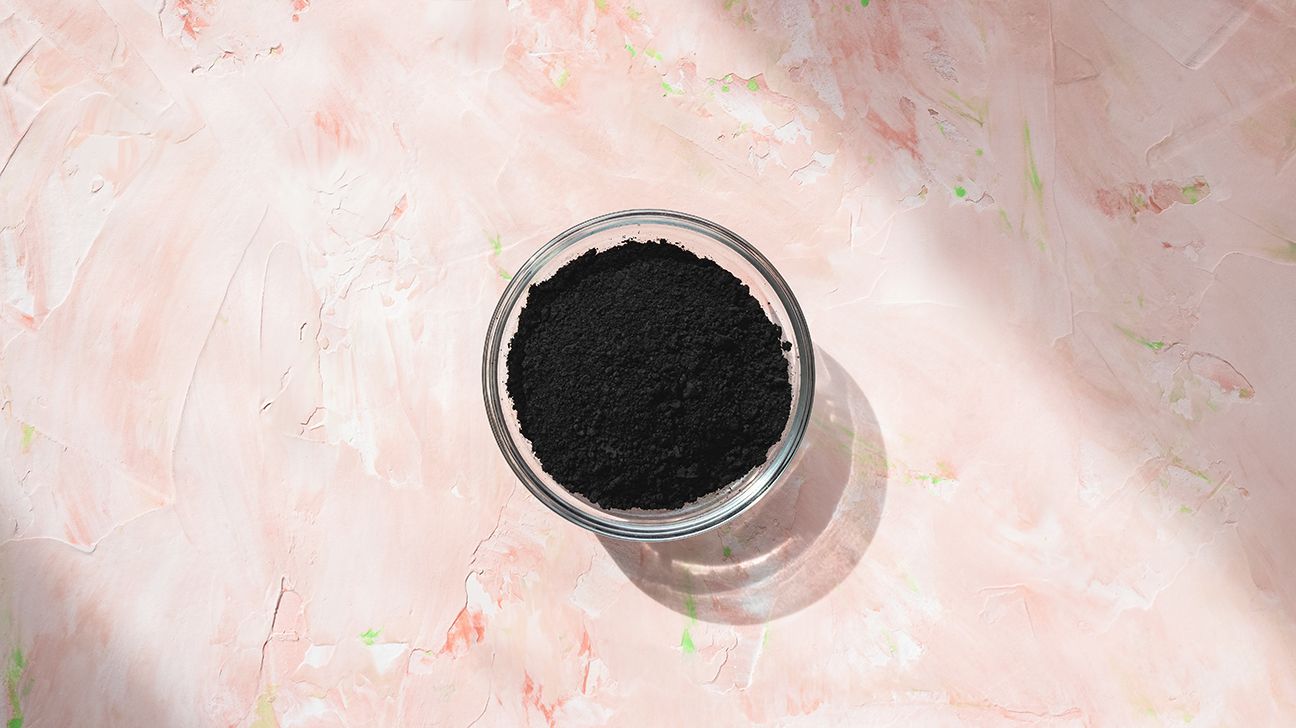Gastroenteritis (stomach flu) causes symptoms like nausea, gas, and diarrhea. Some people use activated charcoal to treat this condition, but there isn’t much evidence to support its effectiveness.

Gastroenteritis is a temporary illness that affects your digestive system. While temporary, its symptoms can be very uncomfortable. Some people take activated charcoal for gastrointestinal relief. But there’s little evidence indicating it’s helpful for treating these symptoms.
Activated charcoal is a highly absorbent and porous black powder. It’s made from superheating natural substances that contain carbon, like wood, coconut shells, petroleum, and peat.
Because it has pores, activated charcoal can absorb and trap certain chemicals. It’s most commonly used in medical settings as an oral treatment for an overdose of some medications or for swallowing poison. It’s not used for all types of accidental poisonings, including those caused by arsenic.
Activated charcoal is used in emergency rooms and is also found in over-the-counter (OTC) products. People buy activated charcoal to treat stomach upsets, hangovers, and high cholesterol, but there’s not much evidence that it helps these conditions.
Many OTC products contain sorbitol, a laxative, along with activated charcoal. If you have diarrhea, these products may make your condition worse.
Gastroenteritis is commonly known as stomach flu or as a stomach bug. This condition is usually caused by viruses or bacterial infections. It may also be caused by intestinal parasites. There’s no significant evidence indicating that activated charcoal can kill parasites. It also doesn’t have antiviral or antibacterial properties. This substance hasn’t been found to be effective at treating any of the root causes of gastroenteritis.
There is a lack of high-quality evidence supporting activated charcoal’s effectiveness for gastroenteritis. For this reason, activated charcoal isn’t typically recommended for treating gastroenteritis.
When to seek medical care for gastroenteritis
Gastroenteritis isn’t usually serious. It often resolves with at-home treatment within a few days. But certain individuals may be at risk of complications, such as dehydration, including:
- young children, especially babies younger than 2 years of age
- adults older than 65 years of age
- immunocompromised people
No matter what your age or health status, get immediate medical attention for these symptoms:
- frequent bouts of vomiting and diarrhea
- rash
- high temperature
- blood in stool
- can’t hold down fluids
- intense abdominal pain
- symptoms of dehydration, including not being able to urinate (pee)
Activated charcoal is considered safe to take orally by most people.
Activated charcoal may slow digestion or cause blockages to occur within your gastrointestinal tract.
It can also reduce the absorption of certain drugs in your system. If you’re taking birth control pills, using activated charcoal may make them less effective. Other types of drugs may also be affected. To reduce this risk, talk with a healthcare professional about when to take it. They may advise you to wait several hours between taking your prescribed medications and activated charcoal.
Side effects of activated charcoal may include:
- constipation
- diarrhea
- black stools
- stomach discomfort or swelling
- vomiting
Activated charcoal hasn’t been shown to have any preventive benefits for gastroenteritis or other forms of stomach illness.
Activated charcoal is sold in capsule, gummy, powder, and liquid form. There’s no specific recommended dose or prescribed daily value for activated charcoal. Manufacturer recommendations vary.
If you choose to take activated charcoal at home, follow the directions given on the product label. Typical dose amounts range significantly from around 100 to 1,200 milligrams.
Don’t give activated charcoal to someone who is semiconscious or at high risk of choking or inhaling it, such as individuals who have a swallowing disorder.
Don’t use activated charcoal if you have an intestinal blockage or a condition that slows the passage of food through your intestines.
Pregnant people and those who are breast or chestfeeding should check with a healthcare professional before use.
Don’t give activated charcoal to babies or children without a pediatrician’s approval.
Activated charcoal and accidental poisonings or overdoses
Activated charcoal doesn’t absorb every type of poison or drug in your intestines.
If you or someone you love, including your pet, has ingested a poisonous or toxic substance, speed is of the essence. Don’t try activated charcoal first. Instead, dial 911 or call poison control at 800-222-1222. Ask if you should take activated charcoal at home or go to the hospital instead.
Does activated charcoal help with gut bacteria?
No. Activated charcoal doesn’t have antibacterial properties.
Is activated charcoal bad for your stomach?
Activated charcoal is bad for your stomach if you have an intestinal blockage or condition that slows digestion.
Activated charcoal may cause side effects like stomach discomfort or diarrhea. Taking the appropriate dose can help you reduce this risk.
Does activated charcoal help with travelers’ diarrhea?
Traveler’s diarrhea has many causes, including parasitic infection. Taking activated charcoal will not treat the underlying cause and will probably not help with your symptoms. To avoid long-term complications, see a healthcare professional for treatment.
What kills stomach viruses?
There are no antiviral drugs currently in widespread use to treat gastroenteritis. Antibiotics don’t work against viruses and are not recommended for this purpose. If you have gastroenteritis, resting, staying hydrated, and letting your condition resolve on its own may be helpful. If your symptoms are severe or worsen, get medical attention.
Activated charcoal hasn’t been found to have benefits for treating gastroenteritis. This substance is only recommended for use in medical settings for certain types of accidental poisoning.
Stomach flu usually resolves on its own with at-home treatments like hydrating and resting. If you have severe symptoms, contact a healthcare professional or get medical care.
